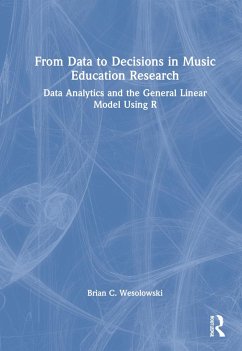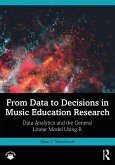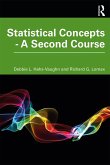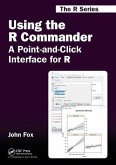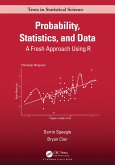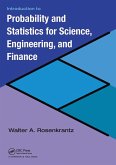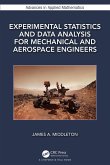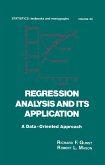From Data to Decisions in Music Education Research provides a structured and hands-on approach to working with empirical data in the context of music education research. Using step-by-step tutorials with in-depth examples of music education data, this book draws upon concepts in data science and statistics to provide a comprehensive framework for working with a variety of data and solving data-driven problems.
All of the skills presented here use the R programming language, a free, open-source statistical computing and graphics environment. Using R enables readers to refine their computational thinking abilities and data literacy skills while facilitating reproducibility, replication, and transparency of data analysis in the field. The book offers:
A clear and comprehensive framework for thinking about data analysis processes in a music education context.
An overview of common data structures and data types used in statistical programming and data analytics.
Techniques for cleaning, preprocessing, manipulating, aggregating, and mining data in ways that facilitate organization and interpretation.
Methods for summarizing and visualizing data to help identify structures, patterns, and trends within data sets.
Detailed applications of descriptive, diagnostic, and predictive analytics processes.
Step-by-step code for all concepts and analyses.
Direct access to all data sets and R script files through the accompanying eResource.
From Data to Decisions in Music Education Research offers a reference "cookbook" of code and programming recipes written with the graduate music education student in mind and breaks down data analysis processes and skills in an approachable fashion. It can be used across a wide range of graduate music education courses that rely on the application of empirical data analyses and will be useful to all music education scholars and professionals seeking to enhance their use of quantitative data.
All of the skills presented here use the R programming language, a free, open-source statistical computing and graphics environment. Using R enables readers to refine their computational thinking abilities and data literacy skills while facilitating reproducibility, replication, and transparency of data analysis in the field. The book offers:
A clear and comprehensive framework for thinking about data analysis processes in a music education context.
An overview of common data structures and data types used in statistical programming and data analytics.
Techniques for cleaning, preprocessing, manipulating, aggregating, and mining data in ways that facilitate organization and interpretation.
Methods for summarizing and visualizing data to help identify structures, patterns, and trends within data sets.
Detailed applications of descriptive, diagnostic, and predictive analytics processes.
Step-by-step code for all concepts and analyses.
Direct access to all data sets and R script files through the accompanying eResource.
From Data to Decisions in Music Education Research offers a reference "cookbook" of code and programming recipes written with the graduate music education student in mind and breaks down data analysis processes and skills in an approachable fashion. It can be used across a wide range of graduate music education courses that rely on the application of empirical data analyses and will be useful to all music education scholars and professionals seeking to enhance their use of quantitative data.

